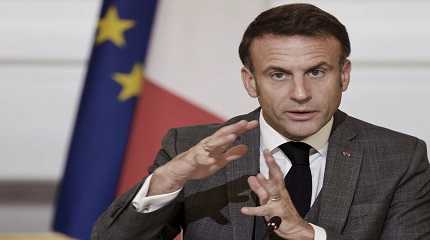
PARIS (AP) — Western and Arab nations, international agencies and nongovernmental groups stressed the urgent need for aid for Gaza civilians at a Paris conference Thursday, held as the humanitarian crisis in the besieged territory worsens amid Israel’s massive air and ground campaign against Hamas.
The gathering ended a few hours before the White House said Israel has agreed to put in place four-hour daily humanitarian pauses in Gaza, starting on Thursday.
The French presidency said the participants’ overall pledges topped 1 billion euros ($1.07 billion) in funding, though that included some funds already announced earlier, and stressed that the global amount still remains to be finalized.
French President Emmanuel Macron opened the conference with an appeal for Israel to protect civilians, saying that “all lives have equal worth” and urging for pauses in the fighting to allow deliveries of desperately needed aid.
“In the immediate term, we need to work on protecting civilians,” he said. “To do that, we need a humanitarian pause very quickly and we must work towards a cease-fire.”
The conference brought together officials from over 50 countries, the United Nations and humanitarian organizations as the Gaza Strip is being pounded by Israel in its war against Hamas, sparked by the militants deadly Oct. 7 incursion into southern Israel.
Israeli authorities were not invited but have been informed of the talks, Macron’s office said. There was no immediate comment from Israel on the conference.
More than 1.5 million people — or about 70% of Gaza’s population — have fled their homes, and an estimated $1.2 billion is needed to respond to the crisis in Palestinian areas.
Macron said that since the Oct. 7 attack, Hamas “shouldered the responsibility for exposing Palestinians to terrible consequences,” and again defended Israel’s right to defend itself.
“Fighting terrorism can never be carried out without rules. Israel knows that. The trap of terrorism is for all of us the same: giving in to violence and renouncing our values,” he added.
Longer term, Macron said diplomatic work must resume on bringing peace to the Middle East, with a two-state solution. “We must learn from our errors and no longer accept that peace ... always be pushed back to later.”
Several European countries, the United States and regional powers such as Jordan, Egypt and the Gulf Arab countries attended the conference, as did Palestinian Prime Minister Mohammad Shtayyeh, who urged the international community to “put an end to the war.”
“How many Palestinians have to be killed for the war to end?” Shtayyeh asked. “What Israel is doing is not a war against Hamas, it’s a war against the whole Palestinian people.”
Egyptian Foreign Minister Sameh Shoukry stressed that Israel had only allowed limited quantities of humanitarian aid through the Rafah border crossing between Egypt and Gaza and urged “the entire international community, and donor countries in particular, to continue supporting the Palestinian people in Gaza.”
“The aid that has already entered Gaza is not enough to meet the needs of the entire population, and the voluntary and deliberate complications imposed by Israel on the delivery of aid only lead to a further deterioration of the situation,” Shoukry said.
Cyprus President Nikos Christodoulides outlined his plan for a humanitarian sea corridor to Gaza “to provide continued rapid, safe and unhindered flow of humanitarian aid” and said the plan is being discussed “with all parties concerned, including Israel.” The plan provides options for the short, medium and longer term, with aid shipments possibly from the Cyprus port of Larnaca, 370 km (230 miles) from Gaza, he said.
The initiative includes the collection, inspection and storage of humanitarian aid in Cyprus, it’s later transfer by ship possibly from Larnaca port and finally it’s offloading and distribution in Gaza.
French officials said they are also considering evacuating the wounded to hospital ships in the Mediterranean Sea off the Gaza coast. Paris sent a helicopter carrier, now off Cyprus, and is preparing another with medical capacities on board.
Italian Foreign Minister Antonio Tajani said his country sent a hospital ship that is en route to Cyprus before deploying as close as possible to the conflict zone.
Thursday’s discussions also included financial support for Gaza’s civilians.
Macron announced France will provide an additional 80 million euros ($85 million) in humanitarian aid for Gaza civilians, bringing France’s funding to a total of 100 million euros ($107 million) this year.
On Tuesday, the German government said it will provide 20 million euros ($21 million) in new funding, in addition to releasing 71 million euros ($76 million) already earmarked for the U.N. agency for Palestinian refugees.
Denmark has decided to increase its humanitarian aid to the civilian population in Gaza by 75 million kroner ($10.7 million), to be channeled via U.N. agencies and the International Red Cross.
European Council President Charles Michel and European Commission President Ursula von der Leyen also attended the conference. The 27-nation bloc is the world’s top aid supplier to the Palestinians. “We have quadrupled the humanitarian support for Gaza and the West Bank, but it’s mostly for Gaza, to 100 million euros ($107 million),” von der Leyen said.
At a news conference following the conference, rights and aid groups urged for an immediate cease-fire, which they said is crucial for them to be able to work in Gaza.
“We’re determined to do everything we can, but if the only thing we get is a day or two without fighting … that won’t be enough,” said Isabelle Defourny, president of Doctors Without Borders France.
Jean-François Corty, vice president of Doctors of the World, said the main challenge “is not so much to mobilize aid as to get it” into Gaza.
“What’s happening in Gaza is a litany of violations of international law ... not seen since World War II,” said Amnesty International’s secretary general, Agnès Callamard, and denounced “indiscriminate, disproportionate, deliberate attacks.”




